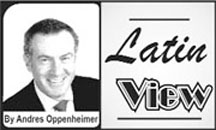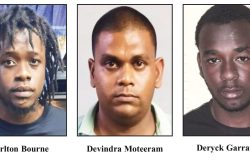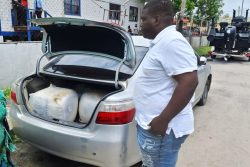While US and Latin American officials say that Venezuela’s political crisis should be solved through upcoming legislative elections, recent testimony before the US Senate raised many questions: It said Venezuela’s voting registry includes the names of so many dead, many states have more registered voters than people.
In March 17 testimony to the US Senate Committee on Foreign Relations, Russ Dallen, editor in chief of the Caracas-based Latin American Herald Tribune, said Venezuelan President Nicolas Maduro’s government is overseeing a voting process that almost guarantees electoral fraud in the legislative elections tentatively scheduled for September.
 Before we get into whether that’s true — some US experts and Venezuelan opposition figures dispute it — let’s take a look at Dallen’s figures.
Before we get into whether that’s true — some US experts and Venezuelan opposition figures dispute it — let’s take a look at Dallen’s figures.
According to his testimony, Venezuela’s voting registry has been manipulated by the Venezuelan and Cuban regimes since late Venezuelan President Hugo Chávez contracted Cuban companies to run Venezuela’s passport and identification agencies.
In 2003, when Venezuela’s opposition launched a campaign for a referendum to revoke Chávez’s term, Venezuela had 11.9 million registered voters. Chávez managed to delay the vote for a year and a half, which gave him time to add more than two million voters, and by 2004 Venezuela had 14 million registered voters, Dallen said.
Angered by his defeat in a 2007 referendum to change the constitution and allow him to run indefinitely, Chávez once again ramped up the registration of names, and added several million new registered voters. By the time of the 2013 elections, which the government-controlled National Electoral Commission awarded to Maduro by 1.5 per cent of the vote, the registry had 18.9 million eligible voters.
“So, the voting registry increased by almost 60 per cent in 10 years. Quite a population boom!” Dallen said in his prepared testimony.
He added that a 2013 study by Venezuela’s Andres Bello Catholic University, UCAB, found that 14 out of 24 states had more registered voters than people. “One of the poorest states, the rural Delta Amacuro, for example, has 122 per cent more registered voters than its estimated population,” Dallen said.
Asked about these figures, the Carter Center’s Americas Program director Jennifer McCoy, who has led several electoral observation missions to Venezuela, told me that the Carter Center and previous UCAB studies “do not find significant voter registry over-inflation, nor states with more registered voters than population.”
A Carter Center 2012 report on Venezuela’s election system said that “no voting registry is perfect. International norms accept a certain degree of inaccuracies, up to perhaps 3 per cent” of the voting registry, as long as they do not help any particular political party.
It added that a 2012 UCAB study had found that while Venezuela has a high percentage of registered voters — 97 per cent of the voting age population — “that’s in accordance with that of comparable Latin American countries.”
Venezuela’s opposition coalition, known by its acronym MUD, said before the 2013 elections that while the number of Venezuelans aged 18 and over had grown by 4.3 per cent during the previous three years, the number of registered voters had risen by 7.3 per cent. But MUD had found the overall voting registry “acceptable,” the Carter Center Report said.
After the 2013 elections, however, the opposition coalition reported that almost 300,000 votes were cast under the names of people who were dead. That amounted to 1.5 per cent of the voting registry.
The Carter Center report concluded that despite the absence of evidence of massive voting registry fraud, international observing missions from the Organization of American States, the European Union and the Carter Center “have long recommended a wide audit of the voting registry.”
My opinion: If Maduro wants to prove to the world that this year’s legislative elections will not be a sham, he should appoint a credible National Electoral Tribunal — one of the main demands of the student protests that left 43 dead last year — allow an audit of the voting registry, and give opposition candidates equal time on television.
That may be too much to ask to a president who has arrested Venezuela’s top opposition leaders, including democratically elected Caracas Mayor Antonio Ledezma and Leopoldo López, on bogus charges that are hard to take seriously.
But if the Obama administration and Latin American countries are serious when they say that Venezuela’s crisis should be resolved at the ballot box, they should start demanding Maduro take these steps to clean up the election process —and they should do it now.
© The Miami Herald, 2015. Distributed by Tribune Marketing Agency.








